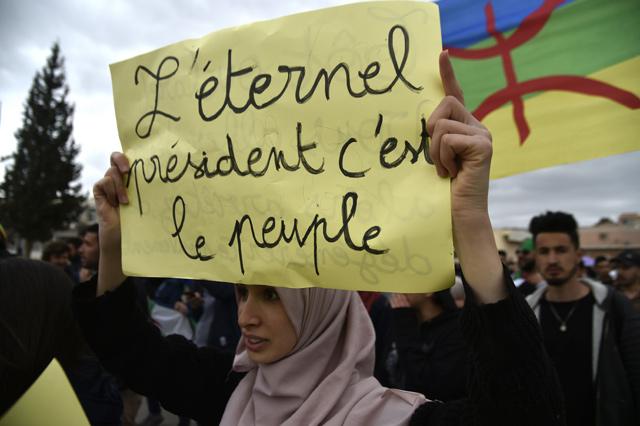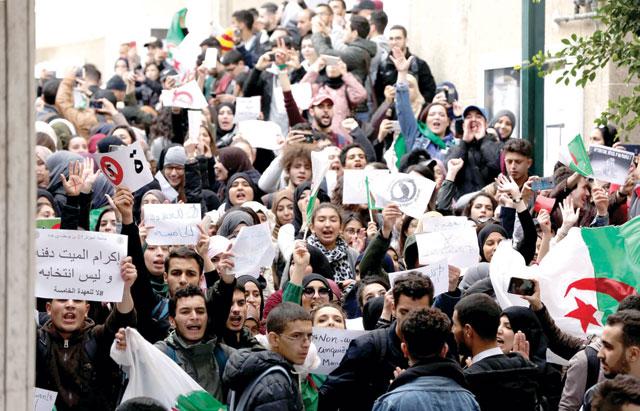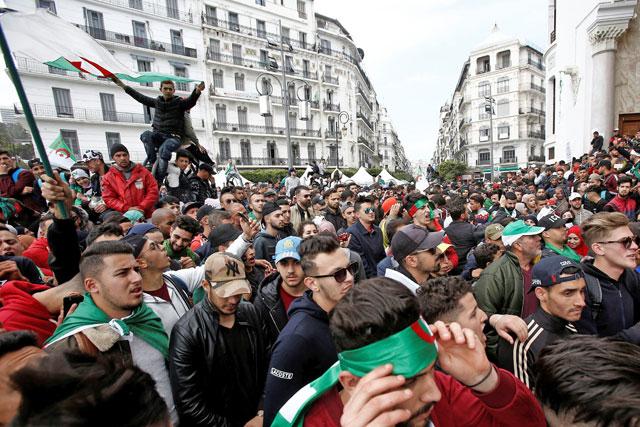You are here
Algeria: Over a one month of anti-Bouteflika protests
By AFP - Mar 27,2019 - Last updated at Mar 27,2019

An Algerian woman raises a placard during a demonstration against President Abdelaziz Bouteflika in the city of Bejaia, some 220km east of the capital Algiers, on Tuesday (AFP photo)
ALGIERS — Algeria has been rocked for more than a month by unprecedented protests against ailing President Abdelaziz Bouteflika, sparked by his bid for a fifth term after two decades in power.
On Tuesday the army chief, Ahmed Gaid Salah, called for the 82-year-old leader to be declared unfit to rule as a way out of the crisis.
Here is a timeline:
First protests
On February 22, tens of thousands of people demonstrate in several cities in the first major protests against Bouteflika's intention to stand in April 18 elections.
After rallying calls on social media, thousands turn, including in Algiers where demonstrations have been banned since 2001. "No fifth mandate," they chant.
Police fire tear gas to block a march on the presidential palace, prompting demonstrators to respond with stone-throwing.
Hundreds demonstrate in Algiers again on February 24.
Warning
In the first official reaction, Prime Minister Ahmed Ouyahia on February 25 calls for "vigilance" at demonstrations.
On February 26, thousands of students rally peacefully in Algiers.
Two days later, a dozen journalists are detained for several hours as they participate in a rally against alleged censorship of protest coverage.
The prime minister compares the growing protest movement to the demonstrations that erupted in Syria in 2011 and sparked a war now in its ninth year.
On March 1, tens of thousands protest across the country.
"Regime murderers", some chant in Algiers. There are also marches in second and third cities, Oran and Constantine.
Final term pledge
On March 2, Bouteflika — in Switzerland for nearly a week for "routine medical checks" — sacks his veteran campaign manager.
The next day, hundreds of students stage new protests in various cities, some chanting: "Bouteflika go away".
That evening a letter from the president is read on state television in which he says his run will be his last. He vows to not serve a full term if reelected and to organise early polls in which he will not stand.
Shortly afterwards his new campaign manager formally submits the president's candidacy, just ahead of the deadline.
‘Chaos’
On March 5, as thousands march again, the army chief pledges to guarantee national security, accusing unidentified groups of wanting a return to the "painful years" of Algeria's 1992-2002 civil war.
Bouteflika on March 7 warns of "chaos" if troublemakers infiltrate the demonstrations.
On March 8, tens of thousands in several cities take part in the biggest rallies yet against Bouteflika's candidacy.
Bouteflika quits race
On March 10, Bouteflika returns from Switzerland. The next day, he pulls out of the race. "There will not be a fifth term" and "there will be no presidential election on April 18," he announces on official media.
Interior Minister Noureddine Bedoui is named prime minister.
But students and teachers are back on the streets on March 12 and 13.
On March 15, a huge crowd marches through Algiers for a fourth consecutive Friday, demanding Bouteflika's ouster. Major protests are held in other key cities.
Holding on
On March 18, Bouteflika issues a statement confirming he will stay on as president beyond the end of his term on April 28 and until new elections are held, following a constitutional review.
On March 19, tens of thousands of students, joined by medics, demonstrate in Algiers, shouting: "students are committed, the system must go!"
On March 20, Bouteflika's National Liberation Front Party says it supports protesters' calls for change while advocating his initiative for dialogue.
‘Unfit’
On March 22, exactly a month after the protests started, hundreds of thousands of Algerians again stage demonstrations across the country, despite bad weather.
On Tuesday, army chief Salah says the way out of crisis is to invoke article 102 of the constitution under which a president can be removed from office if he is found unfit to rule.
Related Articles
ALGIERS — The announcement on February 10 that Algeria's ailing President Abdelaziz Bouteflika will run for a fifth term unleashed a series
ALGIERS — Algeria's army chief called Tuesday for President Abdelaziz Bouteflika to be declared unfit to govern, following weeks of mass pro
PARIS — Algeria has been in political turmoil for seven months, with major anti-regime protests continuing even after the resignation o

















